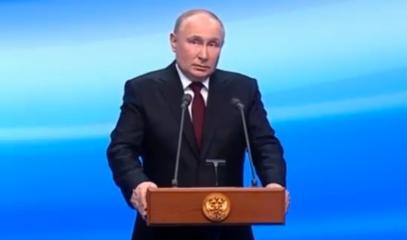
After the plebiscite re-election of the Russian president in the midst of the war even the former Soviet republics of Central Asia are wondering about the repercussions. Many experts believe that in the new mandate there will be a renewed interest of Moscow in the whole area. The knot of Asian migrants.
Moscow (AsiaNews) - Despite now being the fifth re-election as president, to which is added the parenthesis as prime minister for a total of 24 years which will become 30, the new mandate of Vladimir Putin - obtained by flaunting almost 90% of the votes in full war emphasis - raises questions not only among Russian citizens, but also among those of neighboring countries, and especially the former Soviet ones in Central Asia. The Asia-Plus website tried to evaluate possible developments with some experts and political scientists, also recalling what followed the previous 2018 elections.
In the past, elections have proven to be a decidedly unrewarding moment for the lives of Russian citizens: in 2018, despite Putin having promised not to do so, there was an increase in the retirement age, which sparked numerous protests which were stifled in the days of the subsequent championships of the world of football, classifying them as "demonstrations by agitated fans".
The political scientist Ekaterina Šulman fears this time the announcement of a new mobilization for the war in Ukraine, which at the same time would prevent any expression of discontent with other economic measures that are expected, such as the increase in taxation for medium-high incomes and private companies.
There could also be consequences for Russia's relations with foreign countries, and one of the most sensitive issues for Central Asians is certainly the policy of migration, both for work and otherwise, which has recently been subjected to numerous restrictions.
The Tajik expert Parviz Mullodžonov believes that in general relations will remain unchanged, especially with Dushanbe, one of Moscow's most faithful strategic partners: "Russia intends to maintain a high level of influence on post-Soviet countries, trying to curb any their attempt to get closer to the West, and with the mobilization there will be intense maneuvers to involve Asian migrants, especially those in possession of Russian passports, with related pressure on the countries of origin".
Economic conditions will become increasingly difficult for migrants, with the fall of the ruble and the ongoing economic crisis.
According to Sajfullo Safarov, former director of the Strategic Research Center of Tajikistan, "with Russia we are not just partners, but true allies, as can also be seen from the very fraternal relations of our president Emomali Rakhmon with Putin himself, therefore for us things should improve after the elections."
The issue of migrants is more complex than interstate relations, as it is also linked to the illegal activities of migrants themselves in Russia which provoke increasingly harsh, and sometimes disproportionate, reactions from Russian administration and law enforcement officials. For this reason, according to Safarov, "our government must try to intervene to counter excessively repressive actions, and defend the rights of its citizens abroad".
The former head of the Association of Tajiks of Russia, Abdullo Davlatov, confirms the impression that Putin will seek even greater support in Tajikistan and other friendly countries in the region, "especially after the further sanctions against Russia, looking for ways around and alternative."
In the last press conference Putin also announced the creation of a new special structure for the regulation of migratory processes, which involve not only Central Asia; Russia is trying to hire new workers from Africa, South Korea, India, Cuba and other “friendly” countries. This means that "migrants increasingly serve the Russian economy and demography, and after the elections they should encounter a more favorable attitude", underlines Davlatov.
Other experts, such as political scientist Mukhammad Shamsuddinov, also believe that the "new" Putin will turn with more attention and interest to Central Asia, especially if these countries also need military support, "as could happen due to a sudden increase in the threat coming from Afghanistan, which has always remained relevant in the last two and a half years”.
A factor highlighted by many commentators is also the change in feelings towards Russia in the population of these countries, who in the vast majority did not approve of the invasion of Ukraine, and feared in turn being subjected to other forms of Russian occupation, which they report to remember events from the Tsarist and Soviet past.
